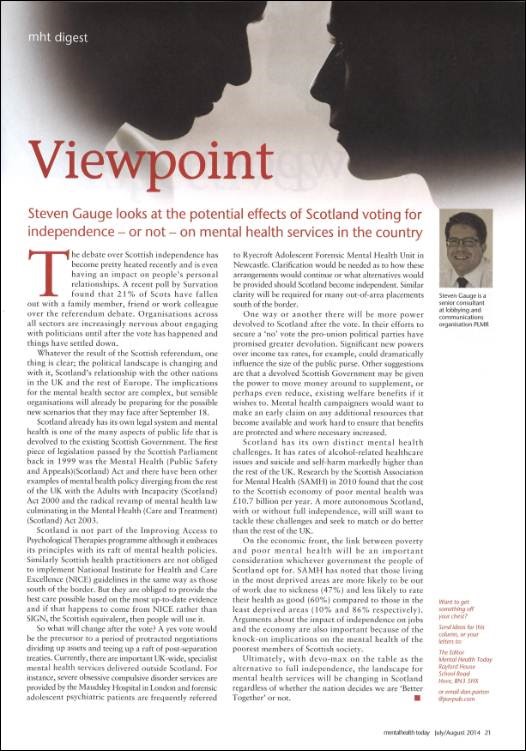The debate over Scottish independence has become pretty heated recently and is even having an impact on people’s personal relationships. A recent poll by Survation found that 21% of Scots have fallen out with a family member, friend or work colleague over the referendum debate. Organisations across all sectors are increasingly nervous about engaging with politicians until after the vote has happened and things have settled down.
Whatever the result of the Scottish referendum, one thing is clear; the political landscape is changing and with it, Scotland’s relationship with the other nations in the UK and the rest of Europe. The implications for the mental health sector are complex, but sensible organisations will already be preparing for the possible new scenarios that they may face after September 18.
Scotland already has its own legal system and mental health is one of the many aspects of public life that is devolved to the existing Scottish Government. The first piece of legislation passed by the Scottish Parliament back in 1999 was the Mental Health (Public Safety and Appeals)(Scotland) Act and there have been other examples of mental health policy diverging from the rest of the UK with the Adults with Incapacity (Scotland) Act 2000 and the radical revamp of mental health law culminating in the Mental Health (Care and Treatment) (Scotland) Act 2003.
Scotland is not part of the Improving Access to Psychological Therapies programme although it embraces its principles with its raft of mental health policies. Similarly Scottish health practitioners are not obliged to implement National Institute for Health and Care Excellence (NICE) guidelines in the same way as those south of the border. But they are obliged to provide the best care possible based on the most up-to-date evidence and if that happens to come from NICE rather than SIGN, the Scottish equivalent, then people will use it.
So what will change after the vote? A yes vote would be the precursor to a period of protracted negotiations dividing up assets and teeing up a raft of post-separation treaties. Currently, there are important UK-wide, specialist mental health services delivered outside Scotland. For instance, severe obsessive compulsive disorder services are currently provided by the Maudsley Hospital in London and forensic adolescent psychiatric patients are frequently referred to Ryecroft Adolescent Forensic Mental Health Unit in Newcastle. Clarification would be needed as to how these arrangements would continue or what alternatives would be provided should Scotland become independent. Similar clarity will be required for many out-of-area placements south of the border.
One way or another there will be more power devolved to Scotland after the vote. In their efforts to secure a ‘no’ vote the pro-union political parties have promised greater devolution. Significant new powers over income tax rates, for example, could dramatically influence the size of the public purse. Other suggestions are that a devolved Scottish Government may be given the power to move money around to supplement, or perhaps even reduce, existing welfare benefits if it wishes to. Mental health campaigners would want to make an early claim on any additional resources that become available and work hard to ensure that benefits are protected and where necessary increased.
Scotland has its own distinct mental health challenges. It has rates of alcohol-related healthcare issues and suicide and self-harm markedly higher than the rest of the UK. Research by the Scottish Association for Mental Health (SAMH) in 2010 found that the cost to the Scottish economy of poor mental health was £10.7 billion per year. A more autonomous Scotland, with or without full independence, will still want to tackle these challenges and seek to match or do better than the rest of the UK.
But an independent Scotland may wish to measure itself against different nations. First Minister Alex Salmond was keen to talk of the arc of prosperity, linking Scotland, Ireland and Iceland to the Scandinavian nations. Denmark, Norway, Sweden and Finland also happen to top the global happiness league tables made up from the statistics compiled between 2010 and 2012 by the United Nations Sustainable Development Solutions Network. The UK was in 22nd place. If an independent Scotland became part of an arc of happiness as well as prosperity the long-term pressure on mental health services might ease.
On a more concrete and economic front, the link between poverty and poor mental health will be an important consideration whichever government the people of Scotland opt for. SAMH has noted that those living in the most deprived areas are more likely to be out of work due to sickness (47%) and less likely to rate their health as good (60%) compared to those in the least deprived areas (10% and 86% respectively). Arguments about the impact of independence on jobs and the economy are also important because of the knock-on implications on the mental health of the poorest members of Scottish society.
Ultimately, with devo-max on the table as the alternative to full independence, the landscape for mental health services will be changing in Scotland regardless of whether the nation decides we are ‘Better Together’ or not.
This article was first featured in the August print edition of Mental Health Today





